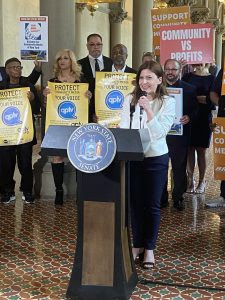 Dr. Despina Afentouli speaking at the Community Media Advocacy Day press conference in Albany, NY. Photo: Bernardo Moronta
Dr. Despina Afentouli speaking at the Community Media Advocacy Day press conference in Albany, NY. Photo: Bernardo Moronta
Journalism is the Fourth pillar of democracy and plays a critical role in a civil society. Unfortunately, the United Nations reports that 85% of the world’s population has experienced a decline in press freedom in their country over the last years. “Truth is threatened by disinformation and hate speech seeking to blur the lines between fact and fiction, between science and conspiracy,” United Nations Secretary-General Antonio Guterres, said in a video message on the occasion of the 30th anniversary of the World Press Freedom Day.
But why is it necessary to support journalists and specifically, local journalists? We need to give voice to local people. We need to cover underreported or untold stories.
The New York Times noted back in 2020, “Local journalism is in crisis and at risk of disappearing,” adding that, “These vital resources are critical to the safety, security and knowledge of our communities, never more so than in these difficult times.”
Indeed – during the outbreak of the Covid-19 pandemic, the time that local media were perhaps more than ever necessary to report for the health and safety of communities, they faced an existential crisis due to limited revenues.
We need more professional, free and independent journalism to secure transparency and equality. Transparency brings responsibility. Truth brings accountability – and when we are free to seek the truth and share it with society, society becomes more just and the world functions better.
Freedom of expression is a fundamental right. And freedom of the press is a human right, as without the right information, we cannot make the right decisions.
As journalists, it’s our human right to report the truth, and to protect voices that remain silent. Nations need to protect the truth and those who report it.
And let’s consider the role of the community media in local and hyper local communities, and their contribution to civic engagement and educational role – the importance of offering modern curriculum for teachers in media and online literacy.
Public, Educational, Governmental media centers serve local communities with local content on issues that matter, offer media opportunities for young people, and create partnerships with social service, cultural, and educational organizations. They support artists and arts organizations in areas where there is no community media center.
We need to build a digital economy and digital equity for New York State and its municipalities. Let’s unite our forces for civil and common good. Freedom of the press secures democracy. And Freedom of expression shapes our societies and the future of the next generations.
*Dr. Despina Afentouli is a journalist-sociologist and researcher.

 NWU is the sole provider of IFJ Press Passes to freelance journalists in the U.S.
NWU is the sole provider of IFJ Press Passes to freelance journalists in the U.S.